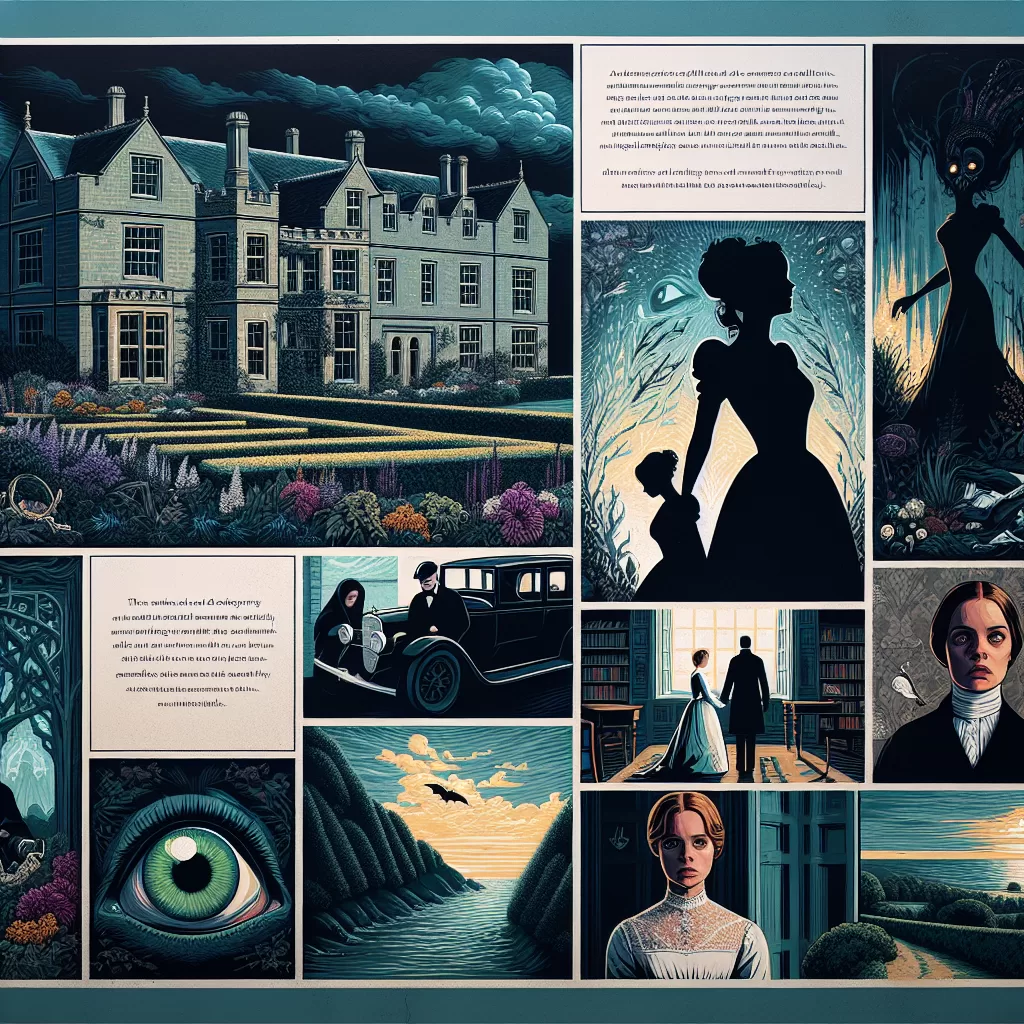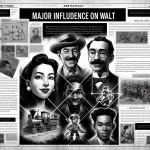-
Indholdsfortegnelse
“Rebecca” is a gothic novel by Daphne du Maurier, published in 1938. The story follows an unnamed young woman who becomes the second wife of Maxim de Winter, a wealthy widower. As she navigates her new life at Manderley, Maxim’s imposing estate, she grapples with the lingering presence of his first wife, Rebecca, whose memory haunts both the mansion and its inhabitants. The novel explores themes of identity, jealousy, and the impact of the past on the present. Key characters include the unnamed protagonist, Maxim de Winter, the enigmatic Rebecca, and the sinister housekeeper, Mrs. Danvers, who embodies the oppressive legacy of Rebecca. Through its rich atmosphere and psychological depth, “Rebecca” delves into the complexities of love, obsession, and the struggle for self-identity.
Rebecca Novel Summary
“Rebecca,” a novel by Daphne du Maurier, is a compelling tale that intricately weaves themes of identity, memory, and the haunting presence of the past. The story is narrated by an unnamed young woman who, after a whirlwind romance, marries the wealthy widower Maxim de Winter. The couple’s relationship begins in Monte Carlo, where the narrator, a timid and inexperienced companion to a wealthy woman, meets Maxim. Their courtship is swift, and soon they find themselves married, returning to his grand estate, Manderley. However, the idyllic setting quickly becomes a source of tension and unease as the narrator grapples with the lingering shadow of Maxim’s first wife, Rebecca.
Upon arriving at Manderley, the narrator is immediately confronted by the pervasive influence of Rebecca, whose memory is meticulously preserved by the housekeeper, Mrs. Danvers. The narrator’s insecurities are exacerbated by Mrs. Danvers, who seems to idolize Rebecca and constantly reminds the new Mrs. de Winter of her predecessor’s beauty and charm. This dynamic creates a palpable sense of dread and inadequacy within the narrator, who feels overshadowed by Rebecca’s legacy. As the story unfolds, the narrator’s struggle with her identity becomes increasingly pronounced, leading her to question her worthiness as Maxim’s wife.
The plot thickens when the narrator discovers more about Rebecca’s life and the circumstances surrounding her death. The revelation that Rebecca was not the perfect woman she was believed to be shatters the narrator’s perception of her. This turning point is crucial, as it forces the narrator to confront her own insecurities and the toxic influence of Rebecca’s memory on her marriage. The tension escalates when Maxim reveals the truth about Rebecca’s character and the nature of her death, which ultimately leads to a dramatic confrontation that alters the course of their lives.
Throughout the novel, du Maurier masterfully explores themes of jealousy, obsession, and the struggle for self-identity. The narrator’s journey is not merely one of romantic entanglement but also a profound exploration of how the past can shape and distort the present. The haunting presence of Rebecca serves as a constant reminder of the complexities of love and the dangers of idealization. As the narrator grapples with her feelings of inadequacy, she begins to assert her own identity, ultimately leading to a transformation that is both liberating and tragic.
In conclusion, “Rebecca” is a rich tapestry of psychological depth and emotional resonance. The interplay between the characters, particularly the narrator and Maxim, is fraught with tension, as they navigate the shadows cast by Rebecca’s memory. The novel’s exploration of identity and the impact of the past on the present resonates with readers, making it a timeless classic. Du Maurier’s ability to create an atmosphere of suspense and intrigue, coupled with her nuanced character development, ensures that “Rebecca” remains a significant work in the literary canon. The story serves as a poignant reminder of the complexities of human relationships and the enduring power of memory, leaving readers to ponder the true nature of love and the legacies we inherit.
Analysis of Themes in Rebecca
Daphne du Maurier’s “Rebecca” is a rich tapestry of themes that intertwine to create a haunting narrative, exploring the complexities of identity, memory, and the nature of love. At the heart of the novel lies the theme of identity, particularly the struggle of the unnamed protagonist to define herself in the shadow of her predecessor, Rebecca. This theme is intricately woven into the fabric of the story, as the protagonist grapples with feelings of inadequacy and insecurity, constantly comparing herself to the seemingly perfect Rebecca. The oppressive presence of Rebecca looms large throughout the narrative, serving as a constant reminder of the protagonist’s perceived shortcomings. This dynamic illustrates the broader theme of how individuals can be shaped and defined by the legacies of others, raising questions about self-worth and the quest for personal identity.
Moreover, the theme of memory plays a crucial role in shaping the narrative. The protagonist’s recollections of her time at Manderley are tinged with nostalgia and uncertainty, reflecting the unreliable nature of memory itself. As she navigates her new life as Mrs. de Winter, the protagonist’s memories of Rebecca and her experiences at Manderley become intertwined, creating a complex web of emotions that influences her actions and decisions. This interplay between memory and reality underscores the idea that our perceptions of the past can significantly impact our present, often distorting our understanding of ourselves and our relationships. The haunting memories of Rebecca serve not only as a source of torment for the protagonist but also as a catalyst for her eventual transformation, highlighting the duality of memory as both a burden and a source of strength.
In addition to identity and memory, the theme of love is intricately explored throughout the novel. The relationship between the protagonist and Maxim de Winter is fraught with tension, as it is complicated by the lingering presence of Rebecca. Initially, the protagonist’s love for Maxim is characterized by a sense of devotion and admiration, yet it is also marked by insecurity and fear of inadequacy. This complexity is further exacerbated by Maxim’s own struggles with his past and his feelings for Rebecca, creating a dynamic that challenges the notion of romantic love as purely idealistic. Instead, du Maurier presents love as a multifaceted emotion that can encompass both passion and pain, ultimately leading to a deeper understanding of oneself and one’s partner.
Furthermore, the theme of jealousy permeates the narrative, manifesting in the protagonist’s interactions with other characters, particularly Mrs. Danvers. The intense jealousy that the protagonist feels towards Rebecca’s memory is mirrored in Mrs. Danvers’ obsessive loyalty to her former mistress, creating a toxic atmosphere that heightens the tension within Manderley. This jealousy serves as a driving force in the protagonist’s journey, pushing her to confront her insecurities and ultimately leading to her growth and self-acceptance.
In conclusion, “Rebecca” is a profound exploration of themes that resonate deeply with the human experience. Through the lens of identity, memory, love, and jealousy, du Maurier crafts a narrative that delves into the complexities of the human psyche. The protagonist’s journey from insecurity to self-discovery is emblematic of the struggles many face in defining themselves amidst the shadows of others. As readers navigate the intricacies of the story, they are invited to reflect on their own identities and the influences that shape them, making “Rebecca” a timeless exploration of the human condition.
Character Study: Maxim de Winter
In Daphne du Maurier’s novel “Rebecca,” Maxim de Winter emerges as a complex and multifaceted character whose psychological depth significantly influences the narrative’s trajectory. As the story unfolds, Maxim is introduced as a wealthy widower, burdened by the shadow of his deceased wife, Rebecca. This haunting presence not only shapes his identity but also complicates his relationships, particularly with the unnamed protagonist, who becomes his second wife. Maxim’s character is marked by a profound sense of loss and guilt, which is intricately woven into the fabric of the plot, revealing the emotional turmoil that defines his existence.
Initially, Maxim appears to be a figure of strength and authority, embodying the archetype of the brooding gentleman. However, as the narrative progresses, it becomes evident that his stoic exterior conceals a tumultuous inner world. The reader learns that Maxim’s marriage to Rebecca was fraught with difficulties, characterized by her manipulative nature and his subsequent feelings of inadequacy. This dynamic is crucial in understanding Maxim’s reluctance to fully embrace his new wife, as he grapples with the lingering memories of Rebecca and the societal expectations that accompany his status. The contrast between his public persona and private despair creates a rich tapestry of emotional conflict, inviting readers to explore the complexities of his character.
Moreover, Maxim’s relationship with the unnamed protagonist serves as a lens through which his character is further illuminated. Initially, he is portrayed as a protective figure, offering her a sense of security and belonging. However, this dynamic shifts as the protagonist struggles with her insecurities and the overwhelming presence of Rebecca in their lives. Maxim’s attempts to reassure her often fall short, revealing his own vulnerabilities and the weight of his past. This interplay between the two characters highlights the theme of identity, as the protagonist seeks to carve out her own place in a world dominated by Rebecca’s legacy. Maxim’s inability to fully articulate his feelings exacerbates the tension in their relationship, underscoring the emotional barriers that exist between them.
As the plot unfolds, Maxim’s character undergoes a significant transformation, particularly in the wake of Rebecca’s true nature being revealed. The discovery of her manipulations and the circumstances surrounding her death force Maxim to confront his own culpability and the extent to which he has allowed Rebecca’s memory to dictate his life. This moment of reckoning is pivotal, as it catalyzes a shift in Maxim’s character from one of passive acceptance to active engagement with his past. He begins to reclaim his agency, ultimately seeking redemption and a renewed sense of purpose in his relationship with the protagonist.
In conclusion, Maxim de Winter is a character defined by the interplay of loss, guilt, and the struggle for identity. His journey throughout “Rebecca” reflects the broader themes of memory and the haunting influence of the past, as he navigates the complexities of love and loyalty. Through his interactions with the unnamed protagonist and the lingering presence of Rebecca, Maxim’s character evolves, revealing the profound impact of personal history on one’s sense of self. Ultimately, his story serves as a poignant exploration of the human condition, illustrating the intricate dance between memory and identity that resonates deeply within the narrative.
Character Study: The Second Mrs. de Winter
In Daphne du Maurier’s novel “Rebecca,” the character of the second Mrs. de Winter serves as a focal point for exploring themes of identity, insecurity, and the impact of the past on the present. The unnamed protagonist, often referred to simply as “the second Mrs. de Winter,” embodies the struggles of a young woman who grapples with her self-worth and the shadow cast by her predecessor, Rebecca. This character study delves into her psychological complexity, illustrating how her experiences shape her journey throughout the narrative.
Initially, the second Mrs. de Winter is portrayed as timid and insecure, a stark contrast to the glamorous and enigmatic Rebecca. Her lack of confidence is evident in her interactions with others, particularly with Maxim de Winter, her husband. Despite his affection, she constantly feels inadequate, haunted by the memory of Rebecca, whose presence looms large over Manderley, the family estate. This sense of inferiority is exacerbated by the manipulative housekeeper, Mrs. Danvers, who serves as a constant reminder of Rebecca’s perceived superiority. The second Mrs. de Winter’s struggle for acceptance and validation is a central theme, as she navigates her new life while feeling overshadowed by the legacy of her husband’s first wife.
As the narrative progresses, the second Mrs. de Winter’s character undergoes a gradual transformation. Initially defined by her insecurities, she begins to assert herself, particularly as she uncovers the truth about Rebecca’s life and the circumstances surrounding her death. This revelation serves as a catalyst for her growth, prompting her to confront her fears and challenge the oppressive atmosphere created by Rebecca’s memory. The second Mrs. de Winter’s evolution is marked by moments of courage, as she learns to embrace her identity and assert her place within Manderley.
Moreover, the second Mrs. de Winter’s relationship with Maxim is pivotal to her character development. Their marriage, initially characterized by a power imbalance, evolves as she gains confidence. Maxim’s love for her becomes a source of strength, allowing her to confront the ghosts of the past. However, their relationship is also fraught with tension, as secrets and revelations threaten to unravel the fragile bond they have built. The second Mrs. de Winter’s journey is not merely about overcoming her insecurities; it is also about navigating the complexities of love and trust in the face of betrayal and loss.
In addition to her personal struggles, the second Mrs. de Winter represents the broader theme of female identity in a patriarchal society. Her character reflects the societal expectations placed upon women, particularly in the context of marriage and domesticity. Throughout the novel, she grapples with the notion of what it means to be a wife and how her identity is intertwined with that of her husband. This exploration of gender roles adds depth to her character, as she seeks to carve out her own identity amidst the constraints imposed by societal norms.
Ultimately, the second Mrs. de Winter emerges as a symbol of resilience and self-discovery. Her journey from insecurity to empowerment resonates with readers, highlighting the universal struggle for identity and acceptance. Through her character, du Maurier masterfully illustrates the complexities of human relationships and the enduring impact of the past on the present. As the second Mrs. de Winter confronts her fears and embraces her individuality, she becomes a compelling figure whose story continues to captivate audiences, inviting reflection on the nature of love, memory, and self-acceptance.
The Role of Manderley in Rebecca
In Daphne du Maurier’s novel “Rebecca,” Manderley serves not only as a grand estate but also as a pivotal character that shapes the narrative and influences the lives of its inhabitants. The sprawling mansion, with its majestic architecture and lush gardens, embodies the themes of memory, identity, and the haunting presence of the past. As the story unfolds, Manderley becomes a symbol of both beauty and decay, reflecting the complexities of the relationships that develop within its walls.
From the outset, Manderley is depicted as an idyllic yet imposing setting, representing the wealth and status associated with the upper class. The protagonist, often referred to as the second Mrs. de Winter, arrives at Manderley with a sense of awe and trepidation. This initial impression underscores her feelings of inadequacy and insecurity, particularly in comparison to the lingering memory of Rebecca, the first Mrs. de Winter. The estate’s grandeur amplifies the protagonist’s internal struggles, as she grapples with her sense of self-worth and her place within the de Winter family legacy.
As the narrative progresses, Manderley transforms into a site of psychological tension. The protagonist’s interactions with the house and its surroundings reveal her growing obsession with Rebecca, whose presence is felt in every corner of the estate. The haunting echoes of Rebecca’s life serve to remind the protagonist of her perceived shortcomings, creating an atmosphere of unease. This dynamic is further complicated by the character of Mrs. Danvers, the housekeeper, who embodies the loyalty to Rebecca and perpetuates the protagonist’s feelings of inferiority. Manderley, thus, becomes a battleground for the protagonist’s struggle for identity, as she attempts to assert herself in a space that is steeped in the shadow of her predecessor.
Moreover, Manderley’s gardens and grounds play a significant role in the narrative, symbolizing the duality of beauty and decay. The lush, vibrant flora represents the allure of the past, while the neglected areas reflect the deterioration of the relationships within the household. The protagonist’s exploration of the gardens mirrors her journey of self-discovery, as she navigates the complexities of her marriage to Maxim de Winter and her fraught relationship with Rebecca’s memory. The gardens, once a source of joy and vitality, become a reminder of the inescapable grip of the past, illustrating how Manderley itself is intertwined with the characters’ emotional landscapes.
Ultimately, the destruction of Manderley at the novel’s conclusion serves as a powerful metaphor for the protagonist’s liberation from the oppressive legacy of Rebecca. The fire that consumes the estate symbolizes the cleansing of the past and the possibility of renewal. In this sense, Manderley transitions from a symbol of confinement to one of freedom, allowing the protagonist to forge her own identity independent of Rebecca’s shadow. The loss of Manderley signifies not only the end of an era but also the potential for new beginnings, as the protagonist emerges from the ashes with a newfound sense of self.
In conclusion, Manderley is far more than a mere backdrop in “Rebecca”; it is a complex character that encapsulates the themes of memory, identity, and the haunting nature of the past. Through its grandeur and decay, Manderley reflects the protagonist’s internal struggles and ultimately serves as a catalyst for her transformation. The estate’s role in the narrative underscores the intricate relationship between place and identity, illustrating how the past can shape, confine, and ultimately liberate individuals in their quest for self-discovery.
The Significance of Rebecca’s Character
In Daphne du Maurier’s novel “Rebecca,” the character of Rebecca de Winter serves as a pivotal figure whose presence looms large over the narrative, despite her physical absence. Her significance extends beyond the confines of the story, as she embodies themes of identity, memory, and the complexities of human relationships. The protagonist, often referred to simply as “the narrator,” grapples with her own sense of self in the shadow of Rebecca’s legacy. This dynamic creates a rich tapestry of psychological tension that drives the plot and deepens the reader’s engagement with the characters.
Rebecca’s character is initially introduced through the memories and perceptions of others, particularly through the eyes of Maxim de Winter, her husband, and the second Mrs. de Winter, the narrator. This method of characterization is crucial, as it establishes Rebecca as an idealized figure, a woman who seemingly possessed beauty, charm, and confidence. The narrator, in stark contrast, feels inadequate and overshadowed by Rebecca’s memory. This juxtaposition highlights the theme of identity, as the narrator struggles to define herself in a world that constantly compares her to the deceased Rebecca. The psychological impact of this comparison is profound, leading the narrator to question her worth and place within the household of Manderley.
Moreover, Rebecca’s character serves as a catalyst for the unfolding drama. Her enigmatic nature and the circumstances surrounding her death create an atmosphere of suspense and intrigue. The secrets that envelop her life and demise propel the narrative forward, as the narrator uncovers layers of deception and betrayal. This exploration of Rebecca’s character reveals the darker aspects of human nature, including jealousy, manipulation, and the quest for power. As the story progresses, it becomes evident that Rebecca’s influence extends beyond her life; she shapes the actions and motivations of those around her, particularly Maxim and Mrs. Danvers, the housekeeper who idolizes her.
The theme of memory is intricately woven into Rebecca’s character, as the past continually intrudes upon the present. The narrator’s attempts to navigate her new life at Manderley are constantly disrupted by reminders of Rebecca, from the lingering scent of her perfume to the haunting presence of her belongings. This interplay between memory and reality underscores the idea that the past is inescapable, shaping identities and relationships in profound ways. The narrator’s journey toward self-acceptance is complicated by her obsession with Rebecca, illustrating how the shadows of the past can distort one’s perception of self.
Furthermore, Rebecca’s character raises questions about femininity and societal expectations. She is portrayed as a woman who defies conventional norms, embodying both allure and danger. Her independence and assertiveness challenge the traditional roles assigned to women, making her a complex figure who elicits both admiration and fear. In this sense, Rebecca becomes a symbol of the struggle for autonomy in a patriarchal society, reflecting the tensions that exist between personal desires and societal constraints.
In conclusion, Rebecca de Winter’s character is significant not only for her role in the plot but also for the thematic depth she brings to the narrative. Through her influence on the narrator and the other characters, Rebecca embodies the complexities of identity, memory, and the darker aspects of human relationships. Her legacy serves as a reminder of the enduring impact of the past on the present, making her a compelling and multifaceted figure within du Maurier’s haunting tale.
The Impact of Class and Social Status in Rebecca
Daphne du Maurier’s “Rebecca” intricately weaves a narrative that explores the profound impact of class and social status on its characters and their relationships. Set against the backdrop of early 20th-century England, the novel presents a stark contrast between the aristocratic world of Manderley and the more modest existence of the unnamed protagonist, who serves as the story’s narrator. This disparity in social standing not only shapes the characters’ interactions but also influences their identities and self-perceptions throughout the narrative.
From the outset, the protagonist’s lack of social status is evident. She is introduced as a young, inexperienced woman who has spent her life in the shadow of her wealthy employers. Her initial encounter with Maxim de Winter, the brooding owner of Manderley, marks a turning point in her life, yet it also highlights her insecurities regarding her social position. As she transitions from a humble background to the opulent world of the upper class, the protagonist grapples with feelings of inadequacy and inferiority. This internal conflict is exacerbated by the lingering presence of Rebecca, Maxim’s first wife, whose memory looms large over Manderley and serves as a constant reminder of the protagonist’s perceived shortcomings.
The theme of class is further emphasized through the character of Mrs. Danvers, the housekeeper at Manderley. Mrs. Danvers embodies the rigid class structure of the time, displaying an unwavering loyalty to Rebecca and a disdain for the new Mrs. de Winter. Her obsession with Rebecca’s memory and her contempt for the protagonist illustrate the complexities of social hierarchy and the power dynamics that exist within it. Mrs. Danvers’ actions serve to reinforce the protagonist’s feelings of inadequacy, as she is constantly reminded that she cannot measure up to the idealized image of Rebecca, who was not only beautiful but also socially adept and confident.
Moreover, the novel delves into the ways in which class and social status dictate the characters’ relationships. Maxim, as a member of the upper class, is expected to maintain a certain demeanor and uphold societal norms. His marriage to the protagonist, who comes from a lower social standing, creates tension and conflict, as he struggles to reconcile his feelings for her with the expectations of his social circle. This tension is palpable during social gatherings, where the protagonist feels out of place and is acutely aware of her status. The judgmental gaze of the upper class serves to isolate her further, highlighting the barriers that class creates in personal relationships.
As the narrative unfolds, the impact of class and social status becomes increasingly pronounced, culminating in a dramatic confrontation that forces the characters to confront their identities and the roles they play within the societal framework. The protagonist’s journey toward self-acceptance is intricately tied to her understanding of class dynamics, as she learns to assert her own identity in the face of societal expectations. Ultimately, “Rebecca” serves as a poignant exploration of how class and social status shape not only individual identities but also the relationships that bind them, revealing the complexities and challenges that arise from navigating a world defined by hierarchy and privilege. Through its rich characterizations and intricate plot, the novel invites readers to reflect on the enduring influence of class in shaping human experiences and interactions.
SPØRGSMÅL OG SVAR
1. **What is the summary of “Rebecca”?**
“Rebecca” follows a young, unnamed narrator who becomes the second wife of Maxim de Winter, a wealthy widower. As she adjusts to life at Manderley, she is haunted by the memory of Maxim’s first wife, Rebecca, whose presence looms large in the estate and in the minds of the staff, particularly the sinister housekeeper, Mrs. Danvers.
2. **What are the main themes of “Rebecca”?**
Key themes include identity and insecurity, the impact of the past on the present, jealousy and obsession, and the nature of love and marriage. The novel explores how the protagonist struggles with her self-worth and the shadow of Rebecca.
3. **Who is the protagonist of “Rebecca”?**
The protagonist is an unnamed young woman who serves as the narrator. Her character is defined by her insecurities and her struggle to find her identity in the shadow of Rebecca.
4. **Who is Maxim de Winter?**
Maxim de Winter is the wealthy widower who marries the narrator. He is complex, grappling with his past and the legacy of his first wife, Rebecca, which affects his relationship with the narrator.
5. **Who is Rebecca?**
Rebecca is Maxim de Winter’s first wife, whose mysterious and glamorous persona continues to influence the lives of those at Manderley even after her death. Her character represents the idealized woman that the narrator feels she can never live up to.
6. **What role does Mrs. Danvers play in the novel?**
Mrs. Danvers is the housekeeper at Manderley and a devoted admirer of Rebecca. She embodies the lingering presence of Rebecca and actively undermines the narrator, fostering her insecurities and jealousy.
7. **What is the significance of Manderley in “Rebecca”?**
Manderley serves as a symbol of wealth, status, and the past. It represents both the beauty and the oppressive nature of the protagonist’s new life, as well as the haunting legacy of Rebecca that permeates the estate.”Rebecca” by Daphne du Maurier is a gothic novel that explores themes of identity, jealousy, and the haunting nature of the past. The story follows an unnamed young woman who becomes the second wife of Maxim de Winter, only to find herself overshadowed by the memory of his first wife, Rebecca. The novel delves into the psychological complexities of its characters, particularly the protagonist’s struggle with her self-worth and the oppressive influence of Rebecca’s legacy. Ultimately, “Rebecca” highlights the dangers of obsession and the impact of memory on personal identity, culminating in a dramatic confrontation that forces the characters to confront their pasts and redefine their futures.







